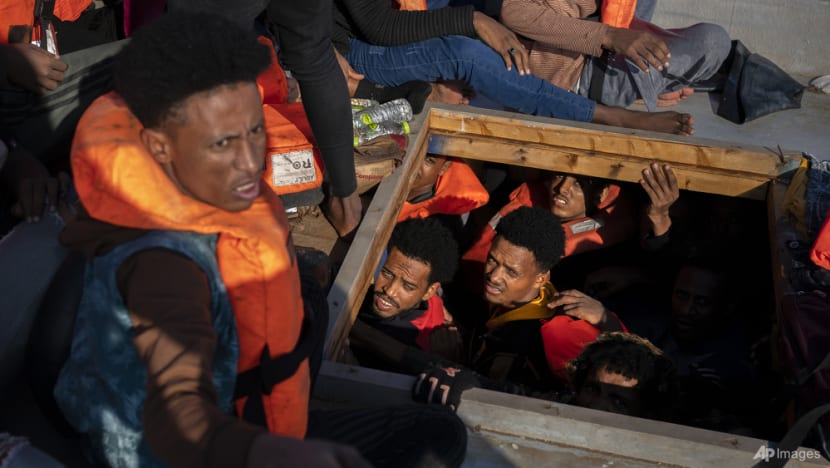Leaders of Britain and Italy take similar ‘offshoring’ approaches to processing migrants
The prime ministers of both countries have vowed to work together to review international rules on asylum seeking.

Migrants from Eritrea, Libya and Sudan crowd the hold of a wooden boat before being assisted by aid workers of the Spanish NGO Open Arms, in the Mediterranean sea, about 30 miles north of Libya, Jun 17, 2023. (Photo: AP/Joan Mateu Parra)

This audio is generated by an AI tool.
ROME: More than 150,000 migrants arrived in Italy by sea last year, many of them picked up by charity rescue boats.
Another 30,000, hoping to settle down in Britain, made the treacherous journey across the English Channel in 2023.
The continued influx of those seeking a better life have forced the leaders of the two countries to tighten their migration policies.
British Prime Minister Rishi Sunak and Italian Prime Minister Giorgia Meloni are looking at dealing with migration through "offshoring", where migrants are processed in a third country.
BRITAIN’S RWANDA BILL
The United Kingdom's parliament is debating the government's controversial Rwanda Bill, which would allow migrants to be sent to the African nation for processing, asylum and resettlement.
Under a five-year agreement, successful asylum seekers could be granted refugee status to stay in Rwanda. None will be allowed to return to Britain.
Ministers who back the treaty said the plan would deter migrants from crossing the English Channel, often in precarious conditions in small boats, to reach the UK.
Despite strong criticism during the bill's first debate in the House of Lords, it was voted to move forward to the next stage.
ITALY’S ALBANIA DEAL
Italy has developed a similar plan to process migrants in nearby Albania – a reflection of the close collaboration between the nations on the issue of migration.
The deal will allow the Italian government to build two centres in the northern Albanian city of Shengjin to process about 3,000 migrants a month.
After their asylum applications have been assessed, they will either be resettled in Italy or be repatriated.
Albania's constitutional court this week greenlighted the agreement, which will go on to be ratified in parliament.
CRITICISMS OVER APPROACH
Both schemes have faced legal challenges and have been met with criticisms from opposition and rights groups.
“They have increasingly criminalised migration and asylum seekers arriving by small boats,” said Dr Francesca Meloni, a social justice lecturer at King’s College London.
“Italian PM Meloni has made asylum claims inadmissible and has criminalised rescue activities at sea in the Mediterranean. We have also seen an interest in offshoring and externalising the asylum process.”
Last year, the European Union clinched a deal on reforming its migration policy, which Ms Meloni pushed hard for, even though she acknowledged it would not solve the problem.
“PM Meloni has had to deal with reality. There can be no blockades, this is against international law. This is a pure electoral argument,” said comparative public law Professor Ciro Sbailo, from the University of the International Studies of Rome.
“Also, thanks to the European Union framework, the reform of the Dublin Treaty has introduced new, tougher measures against illegal immigration.”
BRITAIN-ITALY TIES
The growing partnership between Mr Sunak and Ms Meloni was clear to see over the course of 2023.
Ms Meloni was the only Group of Seven (G7) leader present at an artificial intelligence summit hosted by the UK in November last year.
In return, Mr Sunak flew to Rome last December to speak at a right-wing festival, where he vowed to work with his Italian counterpart to review international rules on asylum seeking.
Both leaders have staked their political futures on this issue, even though there are doubts that governments can control migration flows.
“We have some research showing that these policies don’t stop people from coming, because people will always move,” said Dr Meloni. “However, they will make migration routes more deadly.”
Mr Sunak’s policies will be judged by the British people in elections expected later this year.
And, after admitting that she has failed to curb migration so far, Ms Meloni’s right-wing coalition could start to splinter if she does not make further progress.












